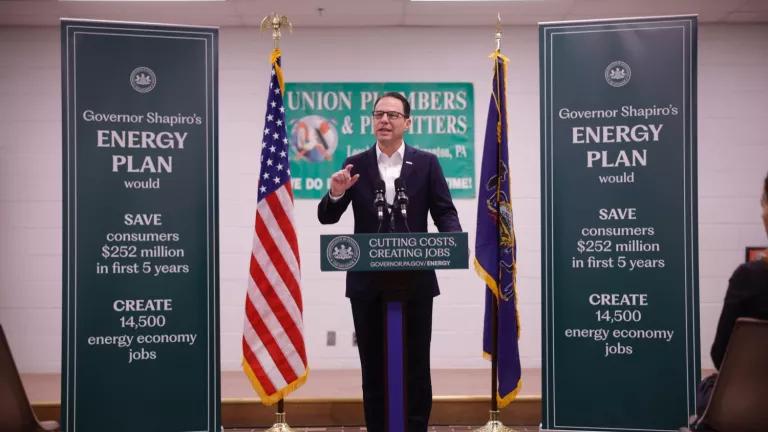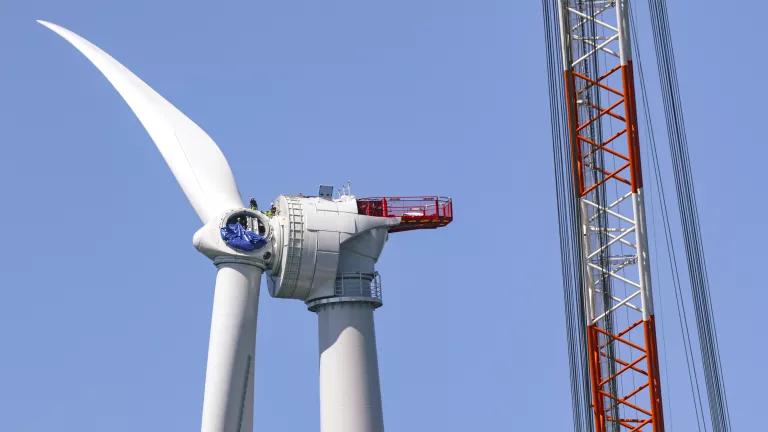Climate Is Both Biggest Risk and Biggest Opportunity

Electric Vehicles, Renewable Energy Show the Way
The warning signs on the disruptive effects of climate change are now blinking bright yellow, with the latest signal coming last week from the global financial community. It’s now becoming clear what the dangerous consequences are of the shaky assumption that trillions of dollars of fossil fuel assets can still be burned without causing global financial chaos. But despite the increasingly dire warnings from scientists and the financial community, we still have our foot on the accelerator, with global emissions ticking up, not down, last year.
Amid the doom and gloom, the financial markets are also sending a clear signal that there is a pathway forward to avoid climate and financial chaos: clean energy.
The markets (as will history) are favoring the bold: Tesla is now worth $100B, surpassing VW as the world’s second most valuable automaker, more valuable than GM and Ford combined. Globally, $288.9 billion was invested in renewables in 2018, and new renewable energy capacity has beaten new fossil fuel and nuclear capacity combined for four years running.
According to the U.S. Department of Energy, wind and solar will now make up 76% of all new generation to be added to the U.S. grid in 2020. Coal, no matter how much the Trump administration tries, is not coming back simply because there are clean, cheaper alternatives.
Renewables are clearly winning in the power sector. Electric vehicles are on the ascendancy. Energy guzzling incandescent light bulbs are going the way of the landline, being rapidly replaced with energy-sipping LED light bulbs.
Winning the fight to avert climate chaos is about capturing and accelerating, as Mindy Lubber of Ceres says, one of the greatest economic opportunities of the 21st century. Clean energy is winning, but the questions remains, is it winning fast enough?
The answer is unfortunately no. Without further action we are heading for warming of about 3˚C by the end of the century, four times more warming than what scientists tell us is the safe limit.
The emissions gap is large, but closable. America’s Pledge, a consortium of cities, states, and businesses, latest report shows that using known technologies, the U.S. can cut its emissions in half in ten years, in line with what scientists tell us is needed to hold temperature increase to 1.5˚C by the end of the century. And fortunately, cities and states continue to move forward on clean energy.
But businesses can also take more actions as demonstrated by recent announcements and events.
Utilities can follow last week’s example of Arizona’s main utility, Arizona Public Service, and commit to 100% clean electricity by 2050, joining at least 15 other utilities from across the country that have made similar commitments.
Investors can follow BlackRock, the world’s largest asset manager, and make investment decisions with environmental sustainability as a core goal.
Fortune 500 companies can lead by example by becoming “carbon negative” by end of decade, like Microsoft recently announced.
Automakers, including GM and Toyota, can at least start by dropping their support for the Trump Administration’s outrageous assault on states’ rights to adopt clean car standards, and follow Ford, Honda, BMW and VW’s example by joining the California voluntary agreement to keep clean car standards on track, as NRDC’s President, Gina McCarthy and four other environmental leaders urged in a letter to automaker CEOs last week.
And Big Oil can stop funding climate change disinformation and shift their massive resources to invest in clean energy. Currently, according to the Carbon Disclosure Project, investor owned utilities spend a paltry one to four percent of their capital investments on low carbon projects.
Ultimately, as David Wallace-Wells, author of The Uninhabitable Earth, said recently on Twitter, “it’s a mistake to treat the climate emergency as an issue. It’s not, it’s an era.”
Climate-laggard fossil-fuel dependent companies would do well to understand this new reality; climate change cannot be merely managed as an “issue” by their government and investor relations teams.
The era of climate change changes everything.



